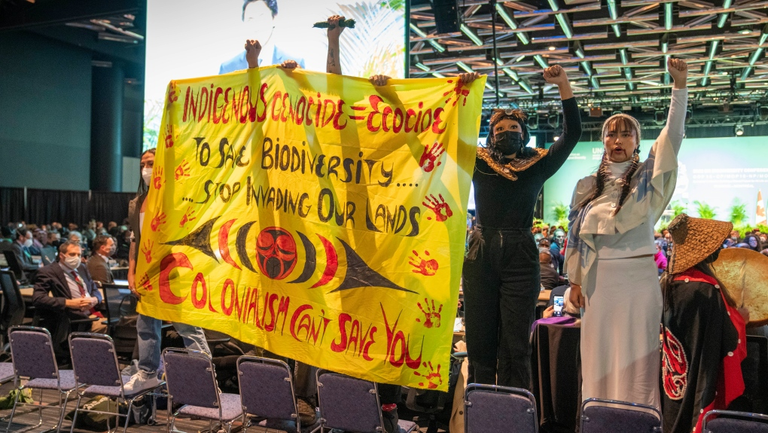Indigenous people in danger after the COP15 decisions!
With the COP15 end, an alliance of indigenous peoples speaks out on the occasion of the conference.
The International Indigenous Forum on Biodiversity (Fiab) demands that the indigenous peoples who live the land be given a voice and that the preservation of nature not be done at their expense.
Indigenous peoples' and local communities' concerns were not appropriately addressed during the opening week of the COP15 biodiversity discussions in Montreal. The 1996-founded International Indigenous Forum on Biodiversity (Fiab) requests specific wording that upholds indigenous rights in the final agreement.
The so-called 30x30 target, which seeks to save 30% of the Earth's surface, causes Fiab considerable concern. Indigenous peoples are negatively impacted by the creation of several of these natural regions and national parks, including 46 in China alone.
They come from Brazil, the Philippines, or Canada, making up 5% of the global population, yet they reside on vast areas that are home to 80% of all plant and animal species, upon which they are reliant for existence.
The remaining lowland gorillas are protected at Kahuzi-Biega National Park in the Republic of Congo, at the cost of Batwa families forcibly driven out of the area.
The NGO Minority Rights Minority reports that since 2019, at least twenty members of this ethnic group have been slain, fifteen women have been sexually assaulted, and several hundred have been forced relocated when troops set fire to their communities.
These troops are directed by the Congolese Conservation Agency to drive them off their ancestral grounds, according to Chief Mbuwa Kalimba Bachirembera. The park managers, who are under investigation and have been told to defend themselves by their donors, claim that they are fighting against poaching and deforestation.
The Tharu ethnic group in Nepal is the victim of what has been called colonial preservation of the Chitwan National Park's natural splendors, sponsored by influential environmental groups like the WWF. Concerned about the hundreds of people being ejected from the Ngorongoro Nature Reserve this year, Lucy Mulenkei, co-president of Fiab and Maasai, declares that a human rights-based approach is important for the establishment of a Global Biodiversity Framework.
The Tanzanian government claims that a relocation program for 150,000 Maasai is necessary because the expanding herds of semi-nomadic animals are disturbing the natural flora and fauna. However, Amnesty International claims that forced evictions are taking place in order to make private hunting or safari areas.
The UN's 30x30 program may constitute the largest land grab in history and further imperil the physical and cultural existence of indigenous peoples if they are not given equal voice in the decision-making process.
Even though indigenous rights are mentioned in the draft under debate, the delegates are still debating word choices. The European Union promotes improved local community involvement from a project's inception. Brazil, Paraguay, and other South American nations insist on using a diluted terminology that can lead to negative connotations.

Congratulations @wolfplayzor! You have completed the following achievement on the Hive blockchain And have been rewarded with New badge(s)
Your next target is to reach 600 upvotes.
You can view your badges on your board and compare yourself to others in the Ranking
If you no longer want to receive notifications, reply to this comment with the word
STOPCheck out our last posts:
Support the HiveBuzz project. Vote for our proposal!